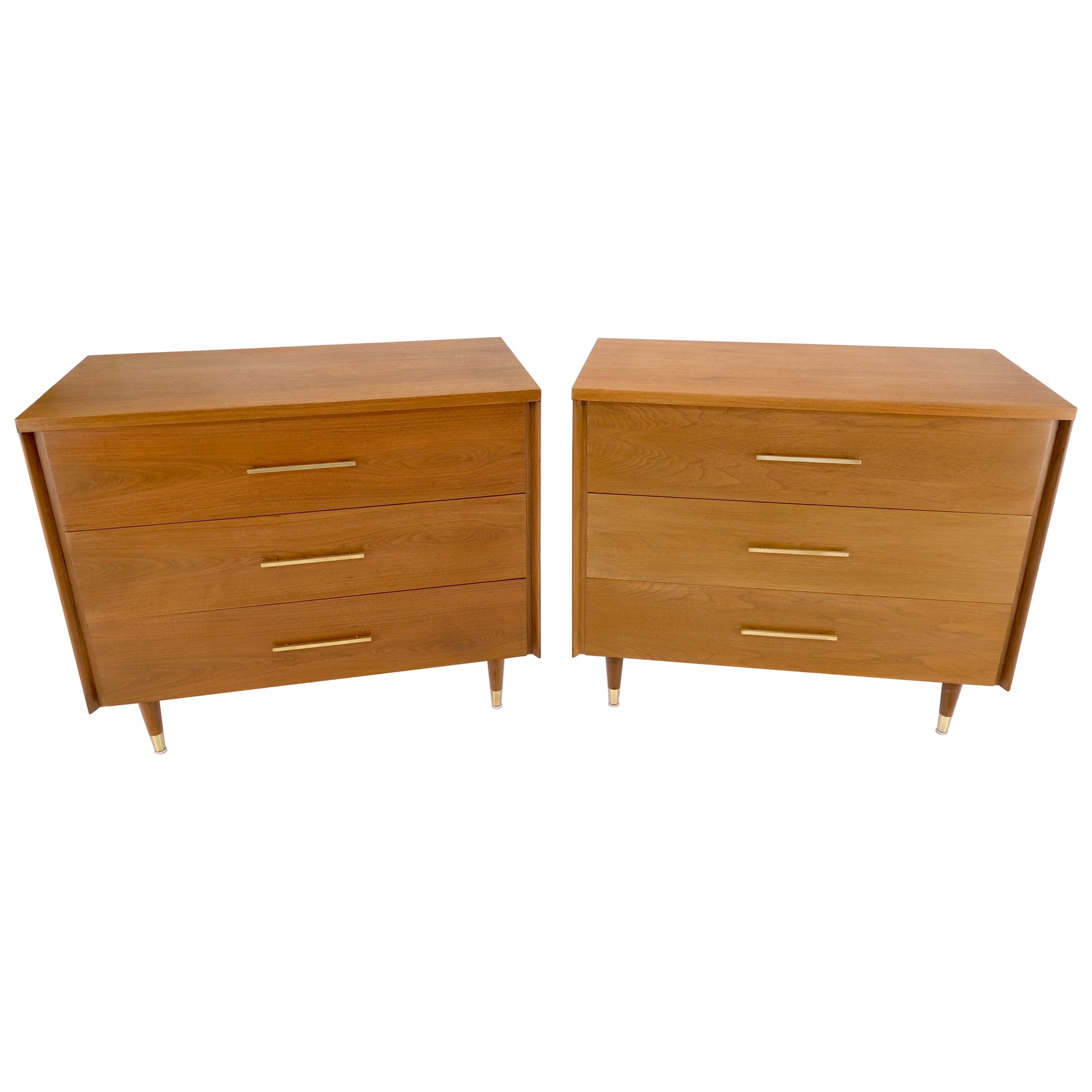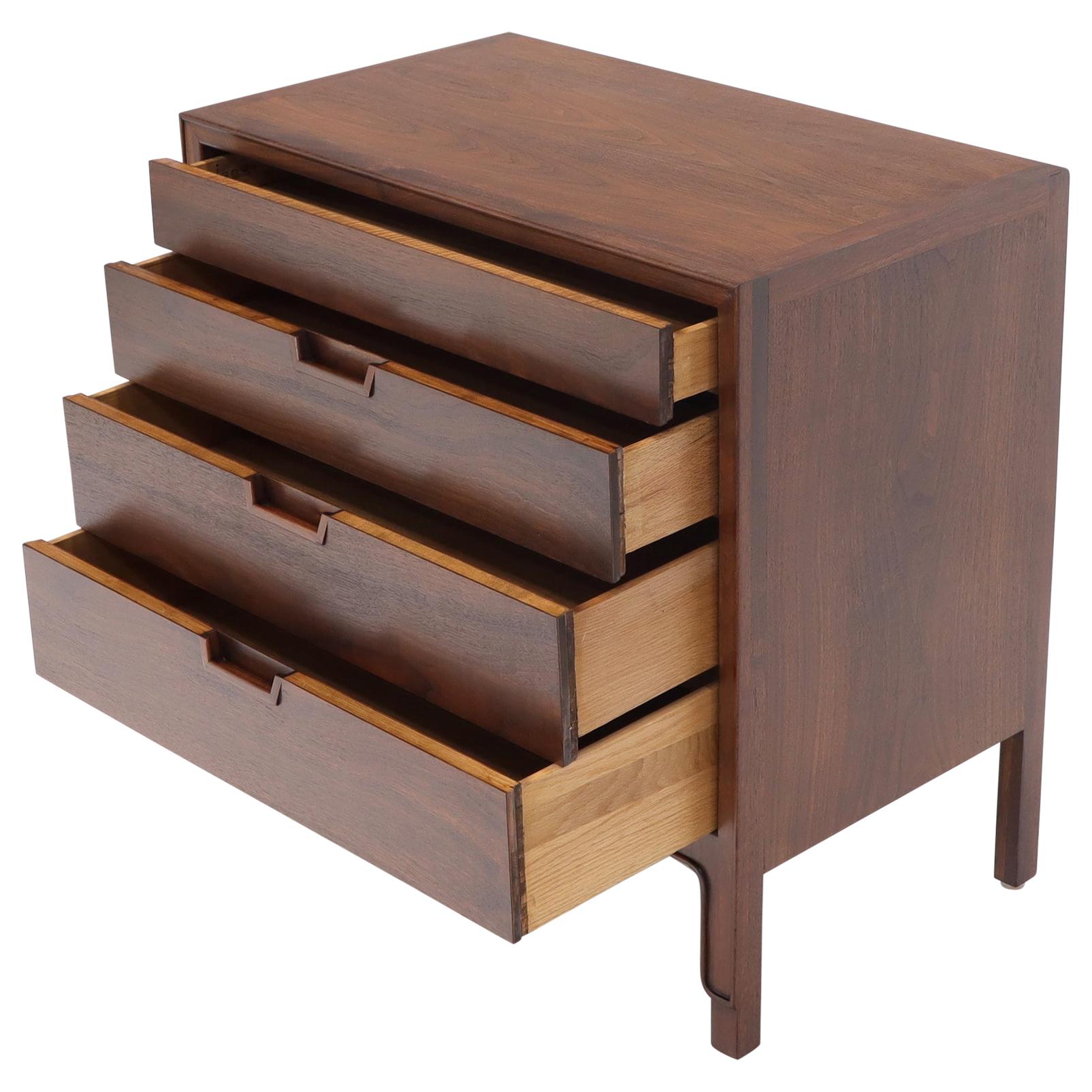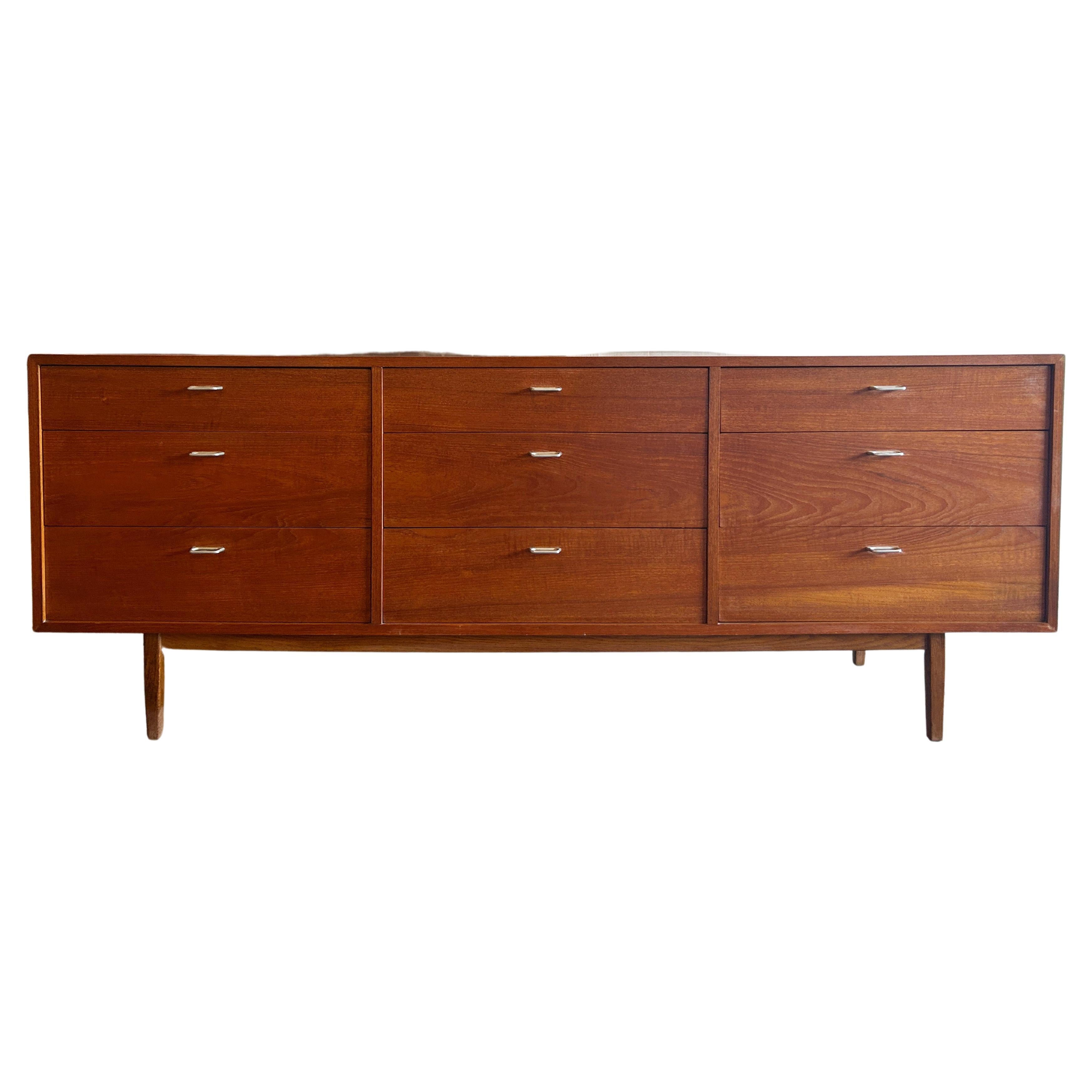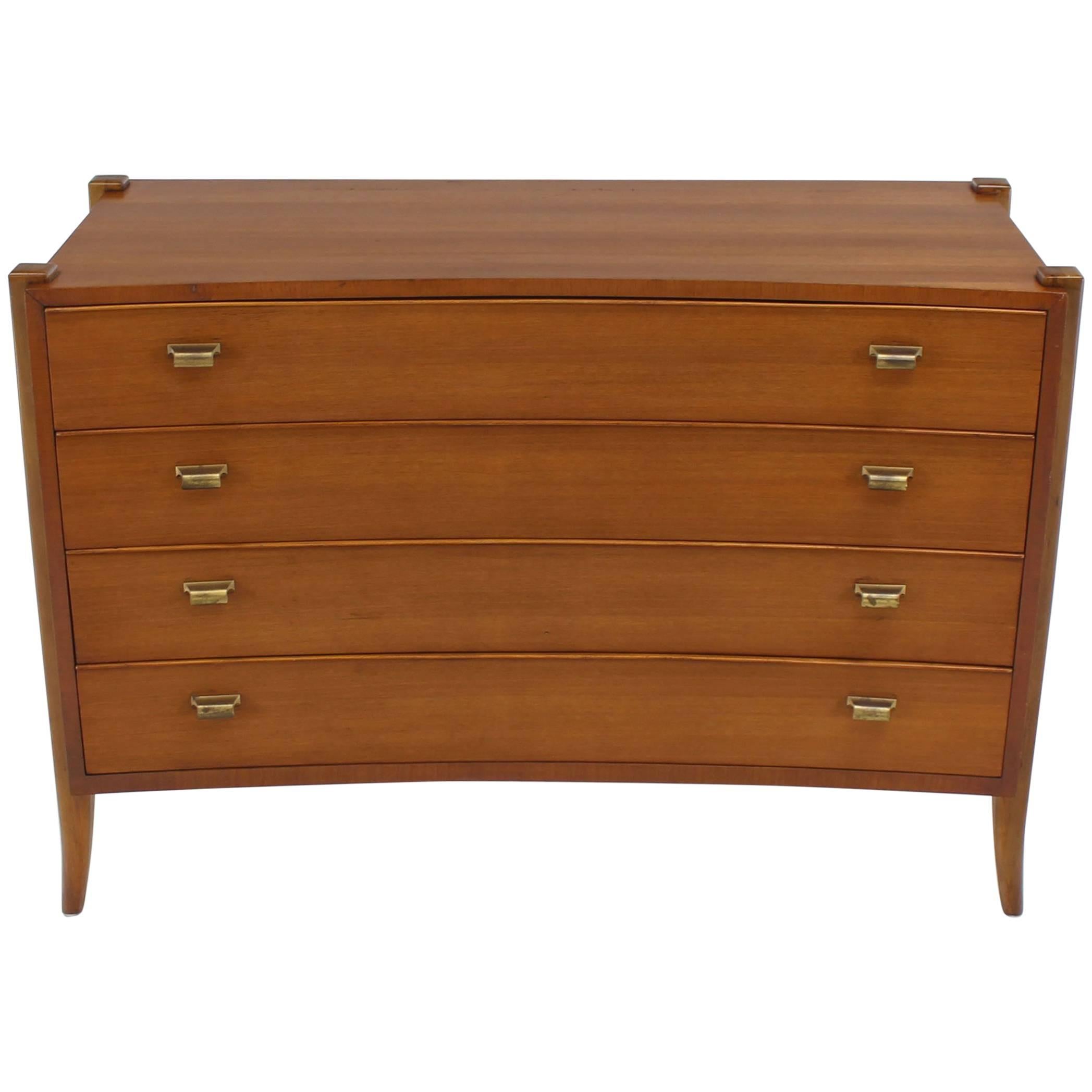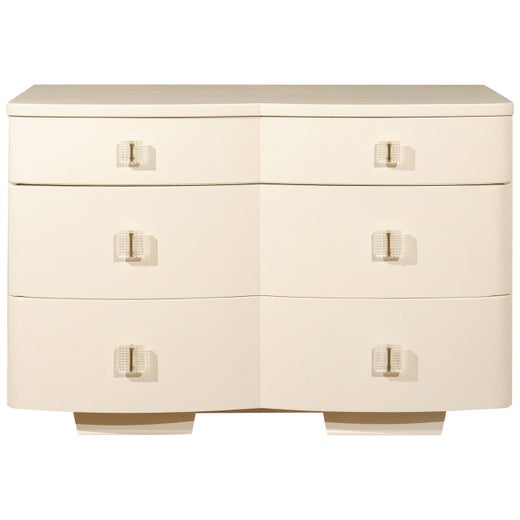Jonn Stuart Mid Century Modern 3 Drawer Aluminum Pulls Bachelor Chest Dresser
About the Item
- Creator:John Stuart (Cabinetmaker)
- Attributed to:George Nelson (Designer)
- Similar to:Herman Miller (Cabinetmaker)Jens Risom (Cabinetmaker)John Keal (Designer)
- Dimensions:Height: 31 in (78.74 cm)Width: 36 in (91.44 cm)Depth: 18 in (45.72 cm)
- Style:Mid-Century Modern (Of the Period)
- Materials and Techniques:
- Place of Origin:
- Period:
- Date of Manufacture:c1970s
- Condition:Refinished.
- Seller Location:Rockaway, NJ
- Reference Number:1stDibs: LU883737973302
John Stuart
Grand Rapids, Michigan, was once known as “Furniture City” for its local mass-production industry that flourished from the mid-19th century into the early 20th century, led by furniture manufacturers like John Stuart. Stuart’s eponymous company, which would build showrooms in New York and Philadelphia, designed and sold elegant reproductions of various furniture styles, including 18th-century French and English furniture as well as what we now call mid-century modern home furnishings built by European craftsmen in the entrepreneur’s Grand Rapids factory.
In 1845, a British cabinetmaker named George Widdicomb arrived in New York before moving to Grand Rapids. There he set up a small cabinet shop in 1857 with a dozen craftsmen, including his son John Widdicomb. The store quickly found success due to Widdicomb’s English training and the dearth of other quality furniture makers in the region. Toward the end of the 19th century, Grand Rapids had earned an international reputation as a leader of American furniture manufacturing, and while the Widdicomb family would navigate some difficulty after the Civil War, they emerged anew as Widdicomb Brothers and Richards, and then the Widdicomb Furniture Company. Widdicomb’s son started his own company in 1897, the John Widdicomb Company, and in 1929, the Grand Rapids–born John Stuart joined the company as a director.
Stuart, who had been in the furniture industry since 1913, was named president of John Widdicomb Company in the early 1940s and by then had formed John Stuart, Inc., with partner Herbert M. Rothschild. John Stuart, Inc.’s offerings included oak buffets and other dining-room furnishings crafted in the Tudor and Elizabethan styles, with cabinet doors and drawer fronts characterized by meticulously carved natural-world motifs and other decorative flourishes. Stuart also oversaw the design of reproductions of sophisticated walnut and mahogany Queen Anne side tables and dining chairs, with the latter marked by pronounced, vase-shaped curves in the back splats and cabriole legs. In 1952, the manufacturer and distributor’s founder sold the business, including the right to trade under his name, to the John Widdicomb Company.
Find a wide variety of vintage John Stuart furniture on 1stDibs.
- ShippingRetrieving quote...Ships From: Hardwick, NJ
- Return PolicyA return for this item may be initiated within 1 day of delivery.
- Pair John Stuart Refinished 3 Drawer Bachelor Chests Dressers W/ Long Brass PullBy John StuartLocated in Rockaway, NJPair John Stuart refinished 3 drawer bachelor chests dressers w/ long brass pulls.Category
20th Century American Mid-Century Modern Dressers
MaterialsBrass
- John Stuart Walnut Mid Century Modern 6 Drawer Long Dresser Thin Edge Style MINTBy John Stuart, Drexel, Jens Risom, George NelsonLocated in Rockaway, NJJohn Stuart Walnut Mid Century Modern 6 Drawer Long Dresser Thin Edge Style MINT!Category
20th Century American Mid-Century Modern Dressers
MaterialsAluminum
- John Stuart Walnut 4 Drawer Bachelor Chest Small DresserBy John Stuart, HenredonLocated in Rockaway, NJMid-Century Modern John Stuart petit credenza 4 drawers bachelor chest dresser.Category
20th Century American Mid-Century Modern Credenzas
MaterialsWalnut
- Bow Front Mid-Century Modern Bachelor Four Drawers Chest Dresser Brass PullsBy Edmond J. Spence, George NelsonLocated in Rockaway, NJCherry sculpted exposed legs bow front Mid-Century Modern dresser chest credenza cabinet.Category
20th Century American Mid-Century Modern Dressers
MaterialsBrass
- Mid-Century Modern George Nelson Herman Miller 5 Drawer Chest Dresser RestoredBy Herman Miller, George NelsonLocated in Rockaway, NJMid-Century Modern George Nelson Herman Miller 5 drawer chest dresser restored.Category
20th Century American Mid-Century Modern Dressers
MaterialsWalnut
- Oiled Walnut 4 Drawers Back Splash Bachelor Chest DresserBy John Stuart, Jens RisomLocated in Rockaway, NJMid-Century Modern walnut four-drawer back splash bachelor chest dresser credenza console cabinet.Category
20th Century American Mid-Century Modern Commodes and Chests of Drawers
MaterialsWalnut
- Mid-Century Modern Low 9 Drawer Walnut Dresser with Aluminum Finger PullsBy George NelsonLocated in BROOKLYN, NYAmerican Mid-Century Modern low 9 drawer walnut dresser with aluminum two finger pulls. Really Good Design and clean inside and out in good vintage condition. Walnut veneer dressers...Category
Vintage 1960s American Mid-Century Modern Credenzas
MaterialsAluminum
- Modern 7 Drawer Mid-Century Dresser by John StuartBy John StuartLocated in Parkesburg, PAFeatures - 7 dovetailed drawers, mounted with brass pulls, and framed border in brass surrounding, Resting up on stretcher style base trimmed in brass accent. Factory original powder...Category
Late 20th Century Mid-Century Modern Dressers
MaterialsWood
- Mid-Century Modern John Stuart DresserBy John StuartLocated in Brooklyn, NYThis beautiful vintage dresser is part of a four-piece set by John Stuart that features a wonderful light natural finish, tapered brass legs,...Category
Vintage 1960s American Mid-Century Modern Dressers
MaterialsWalnut
- Sligh Vintage Mid Century Modern 4 Drawer Painted Cerused Bachelor Chest DresserBy Sligh FurnitureLocated in Philadelphia, PASligh Vintage Mid Century Modern 4 Drawer Painted Cerused Bachelor Chest Dresser. Item features a cerused distressed finish, 4 dovetailed drawers, solid brass hardware, very nice vin...Category
Mid-20th Century American Mid-Century Modern Dressers
MaterialsMahogany
- Pair of Mid-Century Modern John Stuart Parchment Nightstands / Dressers / ChestsBy John Stuart, Tommi ParzingerLocated in Stamford, CTPair of John Stuart Three-Drawer Ebonized Mahogany and Parchment Dressers A pair of 3 drawer Tommi Parzinger esque ebonized mahogany dressers with parchment covered drawer fronts and...Category
Vintage 1940s American Mid-Century Modern Night Stands
MaterialsBrass
- Compatible Pair Mid-Century Modern Dressers, Chests by Paul Frankl, John StuartBy Paul Frankl, John StuartLocated in Stamford, CTPair Mid-Century Modern Double dressers by Paul Frankl for John Stuart, Lacquer Highly compatible Set of two spectacular dressers designed by Paul Frankl for John Stuart, recently f...Category
Vintage 1960s American Mid-Century Modern Dressers
MaterialsBrass, Chrome
Recently Viewed
View AllRead More
The 21 Most Popular Mid-Century Modern Chairs
You know the designs, now get the stories about how they came to be.
A Guide to Herman Miller’s Most Iconic Furniture
The prolific manufacturer has partnered with many of the world’s top designers since opening its doors in 1923. Here are some of the company’s greatest hits, which helped transform the American home and office.
